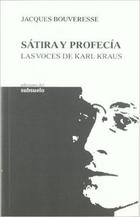Despite living in the great age of Viennese culture, Karl Kraus (1874-1936) he never reconciled with his time. From Die Fackel, his criticism of the media was as productive as relentless. Newspapers saw the starkest example of the political and economic interests, with the power of his numbing language, created a school of banality, conformism, sentimentality and warmongering finally leading to the disasters of the First and Second World War. Jacques Bouveresse discussed in depth various aspects of Kraus not only his diatribes against the press, but also its relationship to socialism and its analysis of Nazism, as yet often misunderstood.
For Jacques Bouveresse, Kraus satires reveal prophetic, because the evils that denounces the Viennese satirist remain ours. The virulent critique of them have not lost one iota of efficiency.








